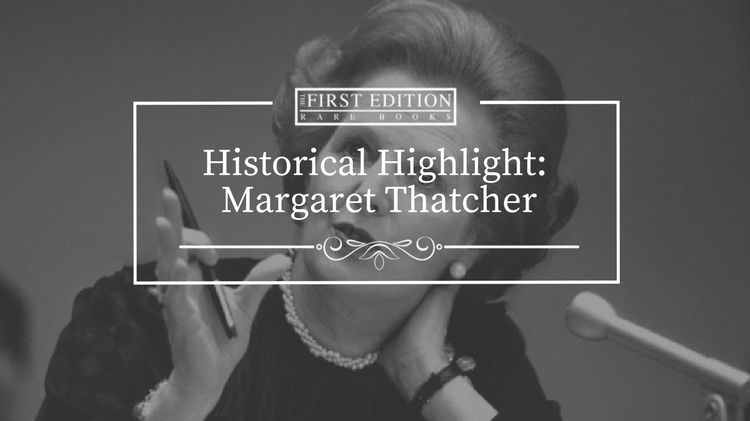
Date of Birth: October 13, 1925
Died On: April 8, 2013
Cause of Death: Stroke
10 Fascinating Facts About Margaret Thatcher
- First female Prime Minister of the UK
- Nicknamed “The Iron Lady”
- Worked as a food scientist to help develop soft serve ice cream in the UK
- Mother to twins, Mark and Carol
- Was the longest serving Prime Minister of the 20th century for the UK
- Was opposed to the EU
- Enjoyed whiskey and sodas at the end of most days
- Was born in parent’s apartment above her dad’s grocery store
- Her favorite poet was Rudyard Kipling
Books Authored:
“The Downing Street Years”
“The Collected Speeches”
“The Path to Power”
“Statecraft: Strategies for a Changing World”
Note: You can find signed copies of “The Downing Street Years,” “The Path to Power,” and “The Collected Speeches” for sale here.
Early Political Career
Thatcher was elected as a Member of Parliament for Finchley. Thatcher ruffled feathers within her party in her maiden speech, by supporting a private member’s bill. This would be a continuous theme throughout her time in Parliament, going against party norms regarding homosexuality, abortion, and hare coursing. Raising quickly through the ranks of Parliament, Thatcher was selected by the United States Embassy to participate in the International Visitor Leadership Program. This was atypical because she was not yet a Shadow Cabinet member. However, she was described as a possible future Prime Minister to the State Department, and they approved her role for the program.
Continuing her trend of moving quickly through the ranks, Thatcher was appointed to the Cabinet as Secretary of State for Education and Science. While serving, Thatcher was often in the public spotlight because of the government’s attempts to cut spending. She gave priority to the academic needs of schools while administering expenditure cuts, which would eventually result in the removal of the free milk program. This would lead her to garner the nickname “Margaret Thatcher, Milk Snatcher.” It would eventually come out that she indeed, in fact, opposed the cuts and appropriation of funds, but the Treasury forced her hand.
Prime Minister (1979-1990)
On May 4, 1979, Margaret Thatcher became the first female Prime Minister of the United Kingdom. During his time as Prime Minister, Thatcher met weekly with Queen Elizabeth II to discuss government business. Although it was rumored that these two developed a power struggle, it was denied by both parties involved. The economy under Thatcher started very poorly, but towards the end of her time was booming. It wasn’t until 1983 before the economy turned for the better under Thatcher. In 1983 inflation and mortgage rates fell to their lowest in 13 years. By 1987 unemployment was falling, the economy stable and the inflation rate was low.
Under Margaret Thatcher, the term “Thatcherism” was born. This described her style of politics and how she would lead the United Kingdom. Specifically, “a political platform emphasizing free markets with restrained government spending and tax cuts coupled with British nationalism both at home and abroad.” Privatization is a crucial piece of Thatcherism. Industries that were privatized under Thatcher were gas, water, and electricity. In most cases, the privatization of the UK benefited the consumers regarding lower prices and improved efficiency.
Thatcher also dealt with the Provisional Irish Republican Army (PIRA) and the Irish National Liberation Army (INLA) during her time in office. These groups were prisoners who carried out hunger strikes to regain the status of political prisoners. As a result, violence increased during this period and eventually would lead to the deaths of 10 prisoners after Thatcher’s refusal. This would lead to an assassination attempt on Thatcher in 1984 by the PIRA. She would survive and eventually grant partial rights to paramilitary prisoners only.
Later Life
Thatcher’s premiership would end in 1990 after being contested by fellow Conservative Michael Heseltine. After losing the second vote against Thatcher initially wanted to challenge the vote and Heseltine, but after consultation, she would eventually succumb and resign as Prime Minister.
It was during her first few years out of power that she would pen two volumes of her memoirs, The Downing Streets Year and The Path to Power. During the time leading up to her death in 2013, Thatcher remained very active in the political world. She made speeches all over the globe on behalf of many different organizations. She was vocally supportive of the United States efforts in the Middle East during the George H. W. Bush administration.
In the years before 2013, Thatcher’s health began to decline. Despite being hospitalized a number of times before her passing, Thatcher attended as many events and ceremonies as physically possible.
On April 8, 2013, Margaret Thatcher passed away at the age of 83 after suffering from a stroke. At her funeral she received full military honors with Queen Elizabeth II and the Duke of Edinburgh in attendance, marking only the second time that the Queen had attended the funeral of a former Prime Minister.
